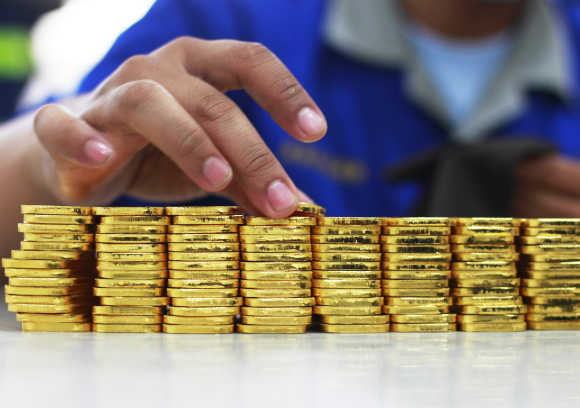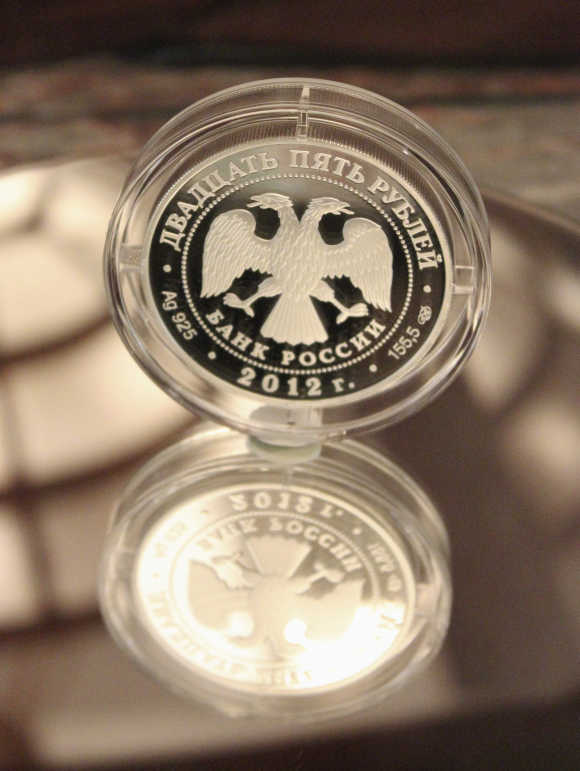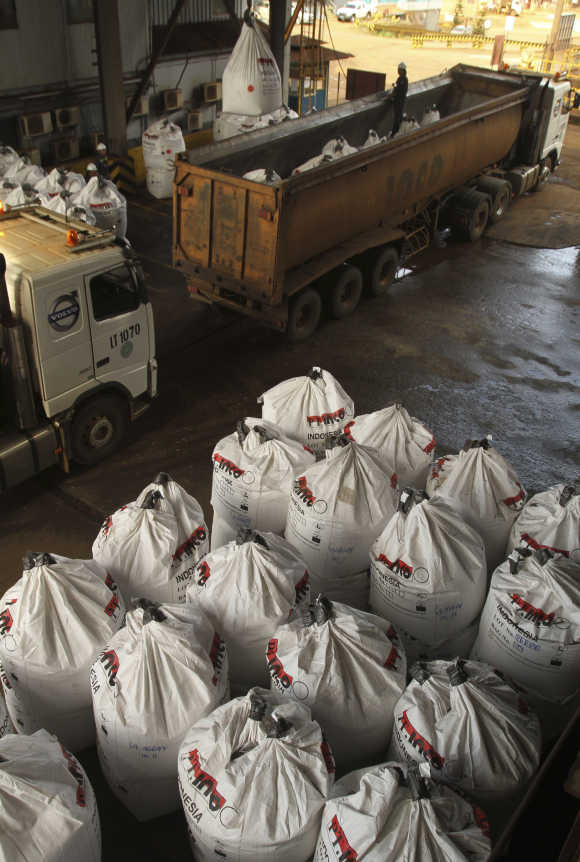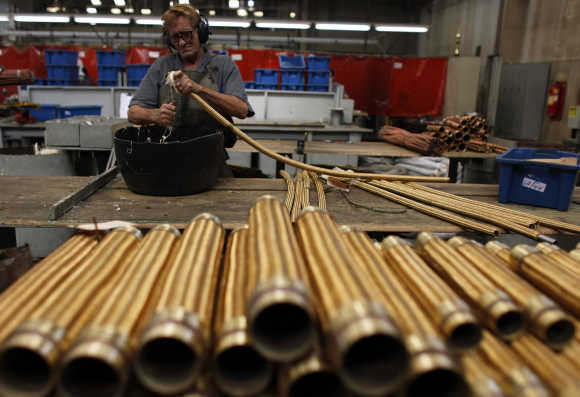 | « Back to article | Print this article |
How to invest in gold, silver, copper, platinum and zinc
Investing in these precious and base metals is as easy as investing in stocks. Here's how...
Investors are often looking for alternative asset classes to invest their savings, other than the traditional options available to them like mutual funds, insurance, LIC schemes and bank fixed deposits. The recent run away rally in gold and craze for gold in India and China is pointing to the fact that investors' trust in paper currencies and financial assets is at all time low. Investors believe that stock markets are subject to manipulation and currencies are subject to devaluation and rightly so. There is a substantial pent up desire to invest in newer asset class like commodities. Investors are lapping up precious metals like gold jewellery and silver bars and coins with both hands. But because of this herd-run, gold is at all time high and silver has become highly volatile, subject to sky-high prices and sudden pullbacks. So are there any other commodity options to invest and how can retail investor benefit from them?
The newer options to invest: Commodities like platinum, copper, lead and zinc
Due to economic resurgence of countries like India and China, commodities like copper, lead and zinc, which are used in almost all aspects of infrastructure development and nation building, have become steadily costlier over the years. This trend will continue for the near future as other emerging countries join the race to development in next few years. Paper money or currencies will devaluate steadily and real assets like base metals and precious metals will appreciate over the next few decades.
Supply of commodities is always limited as there is a physical limit to how much you can dig and extract from mother earth. The process to open a new mine for these commodities is extremely time taking process and is an environment hazard, so all these factors make commodities a good safe bet for investing over the long run.
StockFundoo.com provides insightful and in-depth capital markets analysis. Powered by fundamental deep value investing and technical analysis, we offer detailed stock analysis updated on a daily basis.
How to invest in gold, silver, copper, platinum and zinc
Issues that retail investors face while investing in commodities
But how does a typical retail investor place her/his savings in commodities? Gold and silver is obviously available at your nearby jewellery shop and most bank counters, but how liquid and hassle-free are these options? Banks are happy to sell you these gold coins, but they don't buy it back from you!
If gold is so valuable, why are banks happy to sell, but not willing to buy it back?
And if you have tried selling your gold jewellery back to a jeweller, you know the hassles of doing so. Price for your gold item that you typically receive from the jeweller will be lower than the current market prices. If you try to sell your gold jewellery, he will cite impurity, making loss, melting loss and what you end up receiving is often 10 per cent-15 per cent less than the correct market price.
So in short, investing in even the most popular commodities like gold and silver is nothing short of hassle for a retail investor. In recent times, you have option of investing in gold ETF, which is a mutual fund tracking the prices of gold for you. The issues with gold ETF option are that being a mutual fund it has an expense ratio. Also, various gold ETFs are trading at various prices in market, because each ETF fund has different percentage invested in gold and a small ratio of 4 per cent-5 per cent in cash or liquid funds. But there are no ETFs available for silver, platinum and base metals like zinc, copper, nickel and lead.
How to invest in gold, silver, copper, platinum and zinc
Trading in commodity futures is not investing
If a retail investor wants to invest in precious metals like silver, platinum and base metals like zinc, copper, nickel and lead, there is no easy option available to do so. If you ask your typical investment advisor, s/he may not be aware of any option to do so. At the most, s/he will suggest you to take open commodity futures trading accounts at commodity exchanges like MCX and NCDEX. But commodity trading via futures is extremely hazardous for a retail investor, whose investment corpus is often a few thousand each month or more.
A single lot which is traded in commodity exchanges is worth Rs 3 lakh each, and profit or loss needs to be adjusted at the end of each trading day. i.e. If you trade one lot of lead on MCX, at the end of the day, you need to provide further margin amount if your trade has gone wrong. Otherwise, broker will close your trade, and you will lose the opportunity to stay in the trade. So trading is not investing, and futures trading is not the optimal method for retail trader to explore commodities.
So, how does one invest in commodities on a regular basis like a SIP scheme and how can a retail investor benefit from slow and steady rise in commodity prices over the years.
How to invest in gold, silver, copper, platinum and zinc
National Spot Exchange Limited (NSEL)
National Spot Exchange Ltd (NSEL) is an electronic commodity exchange and spot market, promoted by Financial Technologies (India) Ltd (FTIL) and National Agricultural Cooperative Marketing Federation of India Limited (NAFED).
NSEL is recognised by Ministry of Consumer Affairs, Food & Public Distribution, Government of India. It has obtained licenses from various state governments to facilitate online delivery based trading in various agro-commodities. In addition NSEL also provides delivery based trading in bullions and metals across the country.
NSEL commenced its operations on Oct 15, 2008 and has created efficient spot delivery platform, helping the producers to sell commodities directly to the end buyers. NSEL has been pioneer in offering commodity based investment instruments with the launch of E-series products. NSEL holds a market share of over 98 per cent of the Indian electronic commodity spot market, and has more than 495 registered members operating through over 3,000 trader workstations across India.
How to invest in gold, silver, copper, platinum and zinc
NSEL e-Series products
NSEL has introduced demat based investment products called e-Series, in commodities like gold, silver, platinum, copper, zinc, nickel and lead. This is a unique market segment and functions just like cash segment in equities, and offers commodities in a demat form in small denominations. Simply speaking, you can open an account with your broker at NSEL, and buy and sell small denomination of commodities like you buy and sell stocks or mutual fund electronically.
So if an investor is bullish on silver, he can buy e-Silver product from NSEL in minimum 100 grams denomination and multiples. The silver will be available in your account in demat format, similar to the way you hold a stock certificate in your demat account.
The minimum denominations are very small and affordable for retail investors. One unit of e-Gold product is equal to 1 gram of gold, one unit of e-Copper is equivalent to 1 kg of copper, one unit of e-Lead, e-Zinc and e-Nickel product are equivalent to 1 kg of the respective base metal. You can even invest in precious metals like platinum, and one unit of e-platinum product is equal to 1 gram of platinum. Because of smaller denominations, it's easier for a retail Investor to buy smaller quantity on a regular basis like a SIP scheme, and s/he can hold the commodity in demat form for a hassle free and safe investing.
Account opening instructions for NSEL are available at their website http://www.nationalspotexchange.com/eseries.htm?m=3. One can open a trading account and demat account, and the process is similar to opening a stock trading account with a broker. For more details, you can also refer to the FAQ section provided at http://www.nationalspotexchange.com/eseries.htm?m=3.
To summarise, it is now easy and accessible for retail investors in India to invest in precious metals like gold, silver and platinum and base metals like copper, zinc, lead and nickel. NSEL has provided a unique platform for investors to look beyond financial assets and invest in real assets, which will grow in value over the next few decades as currencies devaluate, commodity reserves dwindle globally and emerging countries like India and China grow hungrier for commodities for their economic growth.





